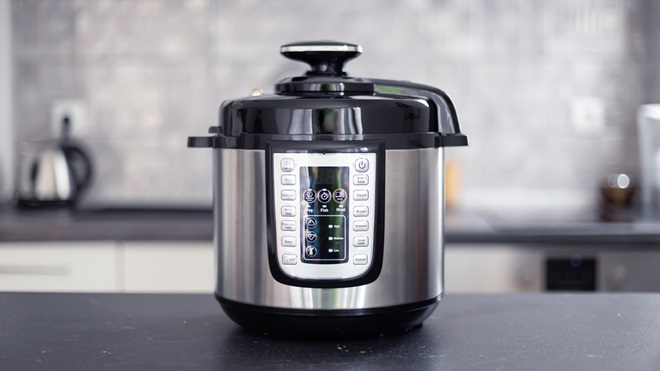Perfectly fluffy steamed rice, slow-cooked curries, melt-in-your-mouth pressure-cooked lamb shanks, crispy air-fried hot chips... whichever delicious recipe you want to whip up in the kitchen, there's a good chance a multi-cooker can help you out.
It's a multi-talented, multi-function solution that can replace a number of appliances in your kitchen, expand your cooking repertoire and save you precious time.
We look at the pros and cons to help you decide if you need this versatile kitchen hero in your life.
CHOICE verdict: If you're time-poor and want to reduce the number of appliances in your kitchen, we think a multi-cooker is a good buy.
What is a multi-cooker?
Multi-cookers combine the functions of several appliances, primarily slow cooking and pressure cooking.
Depending on which model you buy, they can also replace other appliances like rice cookers, air fryers, sous vide machines, electric frypans, yoghurt makers, bread makers and steamers.
They come with pre-programmed settings and are easy to use. They're suitable for people who want flexibility in terms of what they cook (and how quickly they cook it), while reducing the number of appliances in their kitchen.
Well-known brands include Philips, Ninja, Russell Hobbs, Crock-Pot, Tefal, Breville and Sunbeam.
Are multi-cookers any good?
The cost of a multi-cooker can run into the hundreds, so it's reasonable to ask if they're worth it.
In short, multi-cookers can be a great addition to your kitchen. They have the ability to both slow and pressure cook, giving you the flexibility of making last-minute meals as well as slow-cooked braises.
In short, multi-cookers can be a great addition to your kitchen
But how do they compare with standalone appliances?
"In the past, multi-cookers haven't been able to compete with slow cookers in terms of slow cooking, because the faster cooking time meant that the flavour didn't develop as well as in a slow cooker," says CHOICE kitchen expert Fiona Mair.
"However, multi-cookers have come a long way and in our testing we're now seeing multi-cookers outperforming slow cookers, possibly due to better searing and better sealing of the lid during cooking."
Generally, the more features a multi-cooker has, the more it will cost, so be realistic about what you'll use it for
As with any appliance, there are dazzlers and duds, and models at different price points.
Generally, the more features a multi-cooker has, the more it will cost, so be realistic about what you'll use it for: will you really start making your own yoghurt or bread if you don't already?
To make sure you're buying a multi-cooker that does a great job, check our detailed reviews before you shop to find the best multi-cooker for your needs.
Multi-cookers: The pros

1. They'll save you time
Cooking corned beef will take you eight hours in a slow cooker, five hours in the oven – or just one hour using the pressure cook function in a multi-cooker.
"Using a pressure cooker cuts cooking time by at least half, depending on what you're cooking," says Fiona.
2. They'll save you money
With a multi-cooker, you can transform cheap cuts of meat and staples like dried beans into delicious dishes that'll really hit the spot.
Because they cook so quickly, they're also energy-efficient, so you'll use less energy than cooking with your oven or stovetop.

3. They can save space
A multi-cooker can replace a number of kitchen appliances: rice cooker, electric frypan, pressure cooker, slow cooker, air fryer, bread maker, yoghurt maker and steamer.
That frees up a whole lot of cupboard (or bench) space!
(But there is one downside to all these functions. Read on to find out.)
Multi-cookers: The cons

1. They're a pain to clean and maintain
"Multi-cookers can be a bit fiddly to clean," Fiona says. "You need to pull everything apart, clean it, and then make sure it's all been put back together correctly."
Cleaning and maintaining the seals and valves is very important as blocked seals can cause issues when pressure cooking.
And you don't want to mess with exploding cookers – as some Thermomix TM31 owners and Aldi pressure cooker owners found out the hard way. One woman was left with extensive burns when her Aldi pressure cooker exploded.

2. They need supervision
Unlike slow cookers, which you can switch on in the morning before you walk out the door, you can't leave pressure cookers unattended.
This may not be a problem if you're using the pressure cooking function to bang out a meal in under an hour, but it does mean that you can't come home to a meal that's already cooked like you can with a slow cooker.

3. They have lots of accessories to store
The variety of functions multi-cookers come with can be a double-edged sword: they'll save space by replacing multiple other appliances, but with many of the extra functions comes extra accessories... which means you'll need extra cupboard space to store them all.
If you're working with a particularly small kitchen, don't forget to take this into account when you're researching what to buy.
These accessories can be bulky and require separate storage as not all accessories can fit into the bowl
Fiona Mair, CHOICE kitchen expert
"Extra functions such as a steamer and airfryer are handy, but they come with accessories such as steamer baskets and racks and airfryer baskets," says Fiona.
"Some even have two lids: one for pressure cooking and all the rest and one for air frying and roasting. These accessories can be bulky and require separate storage as not all accessories can fit into the bowl."
Stock images: Getty, unless otherwise stated.



